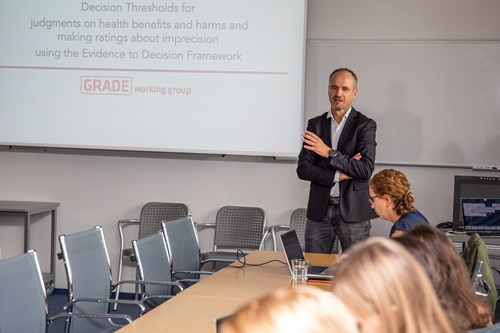Prof. Schünemann has authored or co-authored over 600 peer-reviewed publications (h-index 171/113 google scholar/web of science) and has been named by Thomson Reuters as one of the most influential 3,000 scientific minds of current times across scientific disciplines (from Agriculture to Zoology) since 2015. He is on the list of the top cited scientists of all time with an h-index over 100.
Prof. Schünemann accepted an invitation from Dr Klugar and Prof. Pokorná to teach the specialized workshop for members of the CEBHC-KT. The seminar on the topic of „Advances in GRADE methodology“ was held face-to-face at the Faculty of Medicine, Masaryk University, on September 9, to improve the knowledge on innovations in guideline development processes. The workshop's main topic was setting the decision thresholds for judgments on health benefits and harms when developing evidence-based recommendations using the GRADE approach.
Comprehensive discussion and individual consultations could not be missed. The CEBHC-KT members were excited to discuss their specific work tasks with such a well-respected personality. MUDr. Lucia Kantorová, one of the Centre´s core members who focuses predominantly on guideline methods, said: „I and my colleagues were able to lock in a one-hour consultation with prof. Schünemann to go over a paper we have been working on over the last few months that will eventually present our innovative approach when developing the first Czech COVID-19 clinical practice guideline. We have been cooperating closely with prof. Schünemann, so I have had the opportunity to meet and consult with him in the past, and I can safely say I am always in awe of his on-point insight and efficiency and the encouragement he shows to us, junior researchers.“
The seminar was followed by a meeting with the Dean of the Faculty of Medicine, MUNI, Prof. Martin Repko, and the vice-dean for non-medical study programmes and information technology Prof. Andrea Pokorná. The dean and vice-dean have proposed to prof. Schünemann the position of a Hosting professor at CEHBC-KT at the Faculty of Medicine. “We expect to follow up on the previous fruitful research collaboration between the members of CEBHC-KT and prof. Schünemann as well as explore his possible involvement in advancing our teaching efforts with a special focus on Public Health. We hope prof. Schünemann will consider this proposal .”
It was not the first time Schünemann had visited the Czech Republic. He attended the European JBI symposium of Evidence-Based Healthcare in Clinical Practice Guidelines, the conference in Brno 2018 organized by Dr Klugar's team, where he was invited as the main keynote speaker. At the same time, the Masaryk University GRADE centre and Cochrane Czech Republic were established, and further cooperation followed.
Holger Schünemann, MD, PhD, FRCPC
- Professor, Clinical Epidemiology and Medicine; McMaster University.
- Co-Director, WHO Collaborating Centre for Infectious Diseases, Research Methods, and Recommendations.
- Director, Cochrane Canada, and McMaster GRADE Centre.
- Health Guideline Methodologist with the INGUIDE.ORG Training and Certification program.
RESEARCH INTERESTS: evidence-based medicine, the strength of recommendations, guideline development, systematic reviews, health-related quality of life, knowledge translation, lung function, nutrition and oxidative stress.
He graduated from the Medical School of Hannover (1993 & Dr. med. in 1994) and trained in lung biology, epidemiology, internal medicine, and preventive medicine/public health at the University at Buffalo, State of New York (M.Sc. Epidemiology in 1997; PhD Epidemiology & Community Medicine in 2000). From 2005 to 2009 he was at the Italian National Cancer Center in Rome, Italy, serving as interim chair of the department of Epidemiology from 2007 to 2009, before moving to McMaster University as a full-time Professor and becoming Chair of Clinical Epidemiology and Biostatistics in 2009, widely considered the birthplace of evidence-based health care. As chair of this prestigious department, he has led its longitudinal strategic plan (AGENDA 2020) to refocus the department into the “Department of Health Research Methods, Evidence, and Impact (HEI)”.
Prof. Schünemann advised governments on best practice and guideline projects and led or participated in numerous high-profile guideline panels, including at the WHO, the American College of Physicians, the World Allergy Organization, the European Commission, and ministries of Health. He is co-chair of the GRADE working group (www.gradeworkinggroup.org) and director of Cochrane Canada and the McMaster GRADE centre.
Prof. Schünemann is also a member of the Board of Trustees of the Guideline International Network, the Cochrane Collaboration Steering Group, and member of several other committees. In the INGUIDE.ORG program, he is a co-developer and methodologist (like Dr Klugar).
He co-leads the WHO Collaborating Center for Infectious Diseases, Research Methods and Recommendations at McMaster University that helped produce the eCOVID19 Recommendation Map and other influential work on the COVID-19 pandemic. Thanks to doctor Klugar and doctor Klugarová, CEBHC-KT is also very proud to be one of the many partners of this project.
In 2021, his group was contracted by WHO to help develop the new WHO Quality Assurance Handbook for Normative and Standard setting documents.









